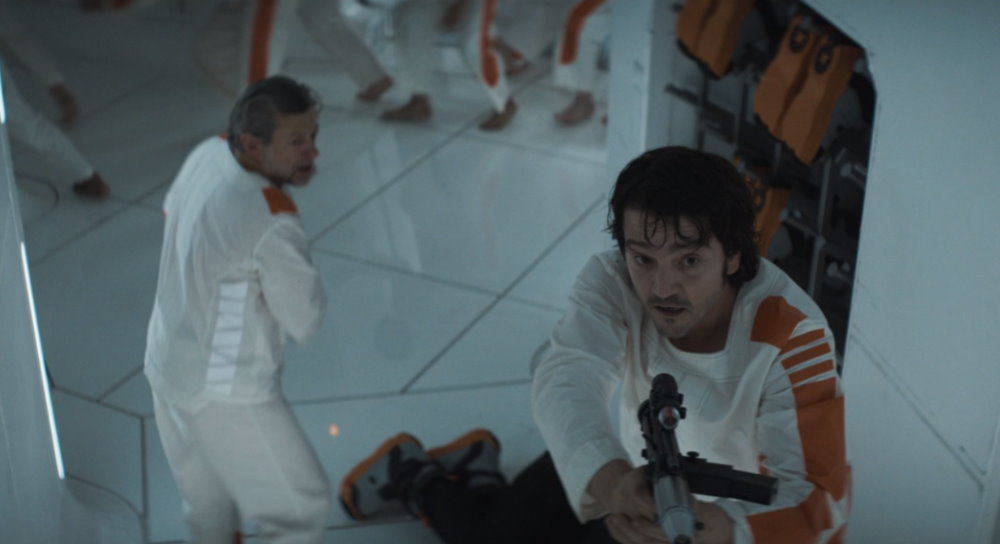Every time an episode of Star Wars: Andor lands, Fantha Tracks will be giving their responses, and here are our initial gut feelings, deep dives and thoughts on episode ten of season one, ‘One Way Out’. Beware of spoilerific elements in here.
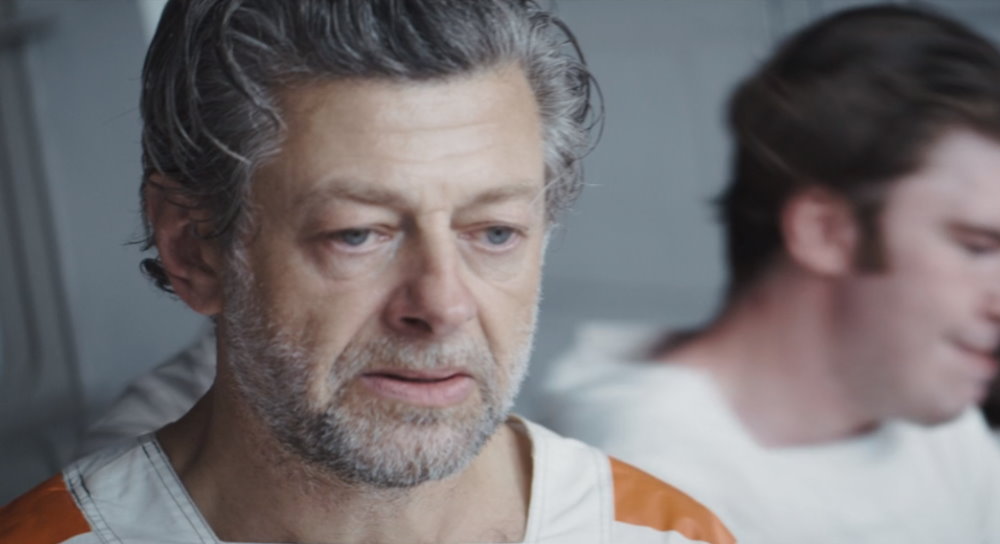 Dan Lo
Dan Lo
In Ocean’s Eleven, Reuben Tishkoff was the first person Danny and Rusty approach about robbing casinos. Reuben’s initial response was not an optimistic one, and for a legitimate reason. “But what am I saying? You guys are pros. The best! I’m sure you can make it out of the casino. Of course, lest we forget, once you’re out the front door, you’re still in the middle of the [expletive] desert!”
Similarly, breaking out of the Narkina 5 facility means that prisoners are still ultimately stuck on a moon, and from what we can tell a rather uninhabitable one at that. The latest installment of Andor ends with Cassian and Melshi running across rocky terrain after an episode-long escape. Aside from the other escapees, who by now are nowhere to be seen for some reason, the duo presumably don’t know anyone else, and they almost certainly don’t know where they’re going or how they plan on getting off the moon yet.
The final episode of the latest in-season arc is a fairly simple one, containing one main event, several unrelated shorter scenes, and a late-season twist. The main event of course is the aforementioned prison break. Kino has some vaguely odd moments of hesitation and fear early on, which make sense later when we find out he can’t swim. Now we fully understand why he says “I’m gonna assume I’m already dead, and take it from there“. We also finally know why Cassian has been sawing away at a water pipe. The rest of the escape seems to more or less go according to plan. Compared to the Aldhani heist, the prison break proves to be a much smoother operation.
The shorter non-prison scenes all take place within the first 15 minutes of the episode, and for the most part serve as setups for unknown future events. Supervisor Jung convinces Major Partagaz that the accident they staged should be immediately investigated to keep up appearances. On Ferrix, we are clued in that Maarva is not taking her medication, as observed by both Cinta and ISB attendant Corv. Then back on Coruscant we see the meeting between Mon Mothma and Davo Sculdun, which quickly ends after Davo requests an introduction between his son and her daughter as the price for his help. The last of these scenes sets up the twist, when Kleya informs Luthen that an unspecified “he” requested an in-person meeting.
The “he” turns out to be Supervisor Jung, who Luthen is on a first name basis with. This scene gives us another great snapshot of the countless layers of deception and spycraft employed by the Rebellion. On Lonni’s end we see and hear the strain of being a double agent and a new father, and with Luthen his permanently forfeited peace of mind from the weight of facing countless terrible decisions. Intentional or not, I also really like how Luthen’s cape has a Vader-esque feel to it.
Two episodes left for the season. Kreegyr’s men are set to walk into a trap, whether on screen or off. Maarva isn’t doing well and it would surely be a matter of time before Cassian makes his way back, or tries. But first, how will he get off Narkina 5? Mon Mothma still has cash flow issues. At least for now. And somewhere in the background, Bix and Syril are still around, waiting to come back into the picture.
There is no doubt about it, One Way Out produced some of the best acting and writing to come from a Star Wars project. That is to say, Star Wars: Andor has a legit shot at winning an Emmy for Best Drama series. When The Mandalorian was up against shows like Succession, Better Call Saul, The Crown, The Handmaid’s Tale, and Ozark for Best Drama in 2020, it had no shot. It’s like that team in the Champions League Group Stage lumped with Bayern Munich, Liverpool, and Barcelona. Thanks for coming, but maybe next year. This is not the case for Andor. Andor is quality work.
One Way Out begins with Kino Loy and Cassian Andor discussing their next moves. Cassian tells Kino they need to leave tomorrow or never. Kino isn’t confident in Cassian’s plan and is reluctant to go. Kino comes off as he is so ingrained in prison life; he’s been there so long that he doesn’t want to leave. He is not conditioned for life outside anymore. Kino is afraid, and that comes out in his voice. He is yelling because he needs to vent. Kino is mentally himself for what’s to come. Kino is on his own little Hero’s Journey.
In these scenes, Andy Serkis gives such a stirring performance. One of three in this episode (Stellan Skarsgård and Genevieve O’Reilly provide the others). Serkis is such a physical presence; his face and body exhume tension which Diego Luna undoubtedly fed off and influenced his performance. When talented actors work together, it’s a visceral feeling. The viewer forgets it is all acting.
At the ISB, Imperial Security Bureau Supervisor Dedra Meero and her colleagues receive news that Anto Kreegyr’s group has taken the bait, retrieved the dead pilot, and asked for a landing bay. Kafrene authorities claim that the pilot died due to a hydraulic failure after exiting hyperspace. Supervisor Lonni Jung convinces Major Partagaz that Imperial forces should not wait but should make their presence felt. Little do we know at this moment, Jung is a double agent working with Luthen Rael. Side note: Jung could be a reference to Carl Jung, the Swiss psychoanalyst who introduced Jungian archetypal events: birth, death, separation from parents, initiation, marriage, and the union of opposites. And archetypal figures: great mother, father, child, devil, god, wise old man, wise old woman, the trickster, the hero. All of which are central to the Hero’s Journey.
On Ferrix, a lady informs Doctor Mullmoy that Maarva Andor has not been taking her medicines. They are being watched by Cinta Kaz, who is, in turn, being watched by Corv, Meero’s assistant. At the Chandrilian Embassy, Mon Mothma and Tay Kolma meet with Davo Sculdun. Davo offers to help Mothma bundle her transactions in ways that make it hard for outsiders to detect. He doesn’t want payment for his troubles but offers to bring his 14-year-old son by to meet Mon’s daughter, Leida. Taking the hint, Mon is disgusted by Sculdun’s offer and asks Kolma to escort him out. O’Reilly really puts on a show with her subtle facial reaction. She’s nearly twitching because she is so repulsed by the offer.
The prisoners on Narkina 5 finally put their plan into motion. They know they vastly outnumber the guards, and the Empire knows this too. Cassian cuts some water pipes causing the floors to flood, and the prisoners use this as a distraction. Queue L7 in Solo: A Star Wars Story, “it’s a mass breakout!” The prisoners overwhelm the guards, but jumping into the ocean far below is the only way out. But Kino Loy can’t swim. Did he know this was the only way out and didn’t say anything to Cassian? If so, this makes his sacrifice that much more tragic. That’s why he was afraid. He knew the only way out and wouldn’t be able to follow through. That is a true hero. He helped the prisoners escape knowing he couldn’t escape with them.
Jumping ahead to the end of the episode, Luthen secretly meets up with Lonnie Jung in the bowels of Coruscant. Jung recently becomes a father and tells Luthen he cannot continue being a spy for him, but Luthen doesn’t want to let Jung go because the rebels need heroes. Again, Stellan Skarsgård melts into his character. He is Luthen Rael, from his cape to his stance, attitude, and sacrifice to see the rebellion grow and move forward. Skarsgård steals every scene he is in. This may be the best performance in Star Wars.
There are only two episodes left in Andor, and it’s been emotionally exhausting in a good way. Cassian and Melshi are seen running across a snowy landscape at the end, which is another nod to THX 1138. Andor shows the chaotic, tense side of rebellion not previously seen in other outlets like Star Wars Rebels. Rebelling is a dirty business, and if you’re not willing to get your hands dirty, then maybe the Empire is the place for you.
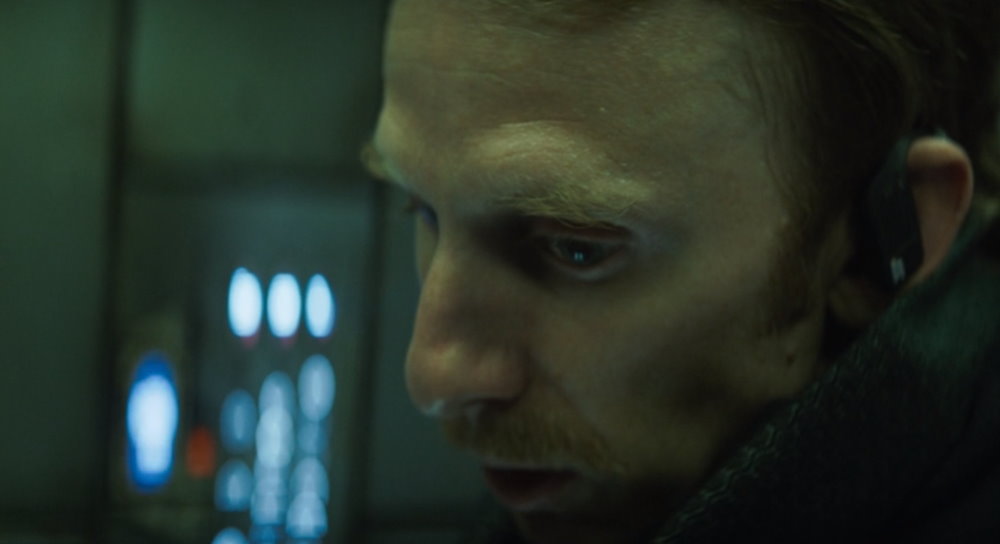 Brad Boutilier
Brad Boutilier
Leverage is a tricky thing.
When properly deployed it can provide outsize returns and enable that which once seemed impossible. When used irresponsibly, one will almost certainly blow themselves up, and often will bring others down with them. Take for example the 1986 leveraged buyout of the Safeway chain of supermarkets. An investment firm bought the company and took it private for $5.5 billion dollars, investing only $129 million dollars of their own money, the remaining balance financed entirely by debt. A short 4 years later, after some restructuring, they took the company public again. Once all was said and done, their total profit on the trade was roughly $7.2 billion dollars. That’s a return of nearly 56x, incredible results.
On the flip side, let’s take a look at FTX and the meltdown currently happening there. FTX is a crypto exchange, recently valued at $32 billion dollars. They lent customer funds to a sister trading firm to leverage the buying power of said firm, in turn producing greater returns then if they’d only been trading with house money. In a classic case of irresponsible use of leverage the company first experienced a liquidity crisis, basically meaning they couldn’t keep the money flowing at the pace their customers were requesting it. This liquidity crisis quickly spiralled into a solvency crisis, culminating with the company filing for bankruptcy Friday morning. The failure of FTX wasn’t limited just to the company. Going down with them was the deposits and investments of all their customers, the investments of many investment firms, the entire net worth of just about every employee of the company, and more then 100 companies owned in part or full by FTX and/or their subsidiaries. It’s too early to know exactly the destruction here, but it’s likely to end up in excess of $50 billion.
As we can see above, being the one wielding leverage doesn’t guarantee you success or the results you desire. What it does guarantee you, however, is outsize power. It compounds both your wins and your losses, and which one of those you end up with is a question of judgement and risk management. Conversely, when someone finds themselves on the opposing side, that is having leverage applied against them, they often find that even should they get what they desire, they end up in a losing
position.
And so, this is the position Mon Mothma finds herself in with Davo. Davo has all the leverage here. Mon has exhausted her options, thus Davo wields outsize power in this situation. As soon as his conditions are laid bare, Mon is working from a losing position, and even if she gets what she wants, she’s still lost. She’s facing securing funding for her nascent rebellion, but at the cost of her young daughter. It’s a terrible choice, but one I’m certain she’ll make. I certainly hope she does for the sake of story and character development.
We see these same themes play out with Luthen and Lonni. Luthen uses fear and intimidation to keep Lonni from bailing on the Rebellion. He leverages his knowledge of his wife and daughter, letting Lonni know that he’s survielling him and knows everything about him, let’s him know that he has sacrificed many lives in service of his cause, and that he’s not afraid to sacrifice more. Surely Lonni is thinking if I try to leave, he’ll kill my wife and daughter, he’ll find us wherever we go, nowhere is safe.
Luthen is effectively blackmailing him into doing what he wants. Luthen shows us that he’s not necessarily a great person, he has done and will do again horrific things. The situation the writers have created here is wonderful, and illustrates what I really love about this series. They’re exploring the realities of conflict and the human experience. The rebels aren’t being portrayed as upstanding, morally correct and morally superior. The ‘good guys’ also do terrible things, and I’m glad we’re seeing that.
There was also a prison break this episode that was pretty good, but the Mon and Luthen scenes were far more interesting to me. Andy Serkis as Kino Loy is great, and he’s become one of the standout characters of the series so far. Honestly, all the characters that have had more then a handful of lines have been standouts. This series has been a revelation for Star Wars, and I hope Disney embraces this even if the viewership figures aren’t too hot. I’m not saying every show has to be dark and gritty, but it’d be nice if they carried over quality writing, quality casting, and good production values. It’s hard to believe this series comes from the same studio responsible for Obi-Wan Kenobi and The Book of Boba Fett.
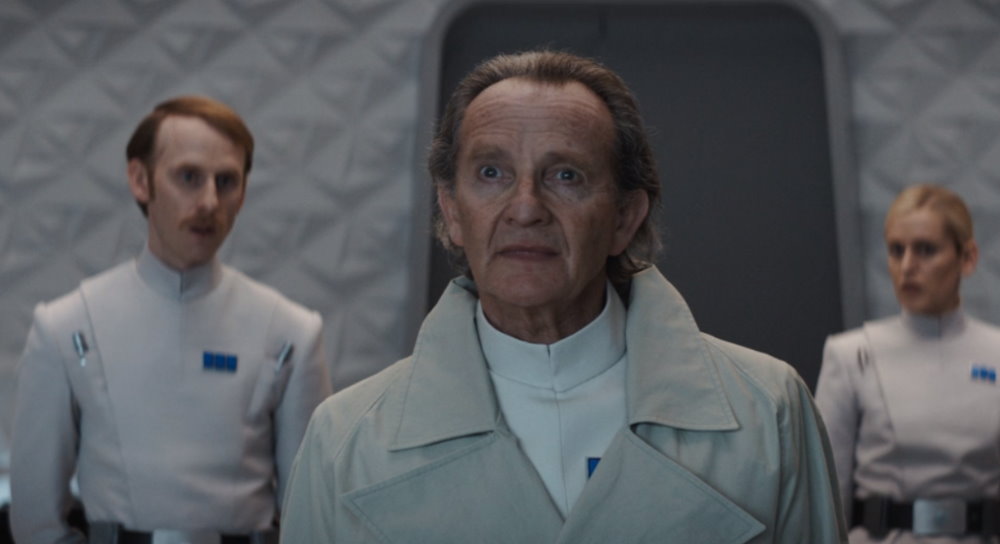 Jen Sopchokchoi Bankard
Jen Sopchokchoi Bankard
How much would you sacrifice for freedom?
That’s the question this episode asks all of its characters, in all its scenes. Cassian asks Kino to risk his life to lead a massive prison break. Classy thug banker Devo Sculdin asks Mon Mothma to offer up her own daughter, Leida, as payment for a loan the Rebellion needs. We learn that one of Dedra’s coworkers at the ISB, Lonni Jung, missed the birth of his daughter because he’s actually Luthen’s mole.
Andor declares its answer to the question with Luthen’s jaw-dropping, hold your breath monologue at the end of this episode. I know I’m starting to sound like a broken record in my praise of the writing in this series, but, as a word nerd, I cannot help but linger on how dazzling the dialogue in every episode of Andor has been.
And this one’s screenplay just blows the roof off of the streaming series house, especially with its conclusion, in which Luthen gives what could possibly be the coldest yet most beautiful pep talk in Star Wars history. After Lonni says that he wants out of the spy game because what he sacrifices daily is too great, he bitterly asks Luthen, “What do you sacrifice?” Luthen gives a crushing response:
“Calm. Kindness. Kinship. Love. I’ve given up all chance at inner peace. I’ve made my mind a sunless space. I share my dreams with ghosts. I wake up every day to an equation I wrote 15 years ago for which there’s only one conclusion. I’m damned for what I do. My anger, my ego, my unwillingness to yield, my eagerness to fight. They’ve set me on a path from which there is no escape. I yearned to be a savior against injustice without contemplating the cost and by the time I look down there’s no longer any ground beneath my feet. What is my sacrifice? I’m condemned to use the tools of my enemy to defeat them. I burn my decency for someone else’s future. I burn my life to make a sunrise that I know I’ll never see. And the ego that started this fight will never have a mirror or an audience or the light of gratitude. So what do I sacrifice? EVERYTHING!”
The content of Luthen’s mic drop monologue feels like the the series’ own manifesto, the theoretical framework through which to view all the other characters’ storylines. What are you willing to sacrifice for the “sunrise that [you] know [you’ll] never see”? This question pulls other characters into Luthen’s orbit and gives the series thematic glue. He’s willing to sacrifice everything knowing that he won’t see the end. That makes everyone else less committed to the cause (and therefore wrong?). This makes sense, as Dedra has named him Axis; in this moment, at least, it seems as if the entire series rotates around him and his point of view.
What this says about Cassian Andor, after whom the show has been named, is debatable. I’ve seen some say that Andor is the least interesting character in Andor and acts more as a facilitator for all these other characters than a traditional protagonist. I might call him Axis Jr. because he does lead like Luthen, but specifically by boosting those around him and helping them reach their potential. He gives Taga credit for his own idea to switch up the table order during last week’s episode, and here we see him coaching Kino during the prison break. He doesn’t get on that loudspeaker; he helps Kino do so. Then, when Kino falters, Cassian says, “Is that the best you’ve got?” and that propels Kino into a moment of greatness.
If we ask what Kino sacrifices for the freedom of the 5,000 men on Narkina 5, the likely answer is his own life. When he first tells the other men on his cell block that they’re going to try to escape that day, he says that because he now knows none of them are ever getting out, he plans to “assume I’m dead already and go from there.” He’s already accepted that his life may be forfeit in this endeavor, but that will still be worth it if some of them can make it out alive. This echoes Luthen’s statement about the sunrise he’ll never see. He knows many of them, including himself, may not make it through to the end, but that doesn’t mean they shouldn’t try.
I see a lot of people struggling to believe Kino makes it somehow. This Tony Gilroy quote from his Hollywood Reporter interview may give you all some hope.
I see a lot of people struggling to believe Kino makes it somehow. ThisTony Gilroy quote from his Hollywood Reporter interview may give you all some hope. pic.twitter.com/rW5ezw0qlq
— Director Bennic (@zenkenobi) November 10, 2022
The character in this episode least willing to sacrifice anything in the name of freedom is Mon Mothma, who finds herself at a personal ethical crossroads. Davo Sculdun, who has no need for a fee but wishes to use Mon Mothma’s family as a way to climb the Chandrilan social ladder, asks that in exchange for the loan and financial discretion, she invite him and his teenage son back so that he might meet her teenage daughter. Mon Mothma (very reasonably) seems unwilling to sacrifice her own daughter for the cause, unwilling to “burn [her] own decency,” as Luthen says he has. Does Luthen’s speech foreshadow a turn in which she eventually agrees to Sculdun’s terms? Or will she continue to serve as a counterpoint to his no matter the cost approach? One of the many, many things I love about this show is its presentation of all the rebel factions, each with their own political philosophy and principles. So I’m genuinely torn about not only which scenario I think we’ll get, but which I’d rather see. I’d optimistically like to think that if anyone can find another way to fight the good fight while maintaining her integrity, it’s my queen, Mon Mothma. (I’m going to be so wrong, though. I’m in denial big time here.)
Between the metaphors, the imagery, and the moving syntactical rhythms or spellbinding turns of phrase in Luthen’s monologue, I would deem this episode the most poetic of the season so far, and potentially one of the more poetic episodes of television I’ve ever seen. I cannot wait to see what the two-part finale will bring, and what new heights to which it can soar (not swim).
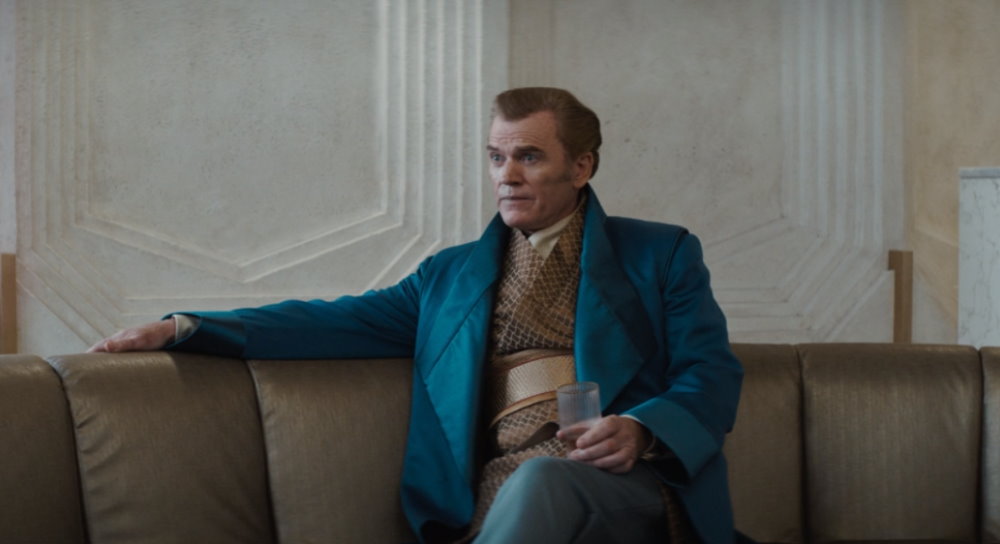 Becca Benjamin
Becca Benjamin
The 10th episode of Andor: One Way Out aired Wednesday, November 8th, on Disney Plus, and there are only two episodes left in the season to tie it all together.
That said, so much emotion in this latest episode of Andor; palpable, and for me that is a storytelling necessity. It keeps me invested and coming back for more. Andor is showing us (exactly) what Chirrut meant when he told Cassian in Rogue One: A Star Wars Story, “There is more than one sort of prison, Captain. I sense that you carry yours wherever you go.”
Almost everyone we met (so far) in the series is a prisoner of their (own) unique prison. And, whether it be a literal prison or a figurative prison, the repercussions are equally detrimental. Hearing and watching Mon Mothma ask, “what makes you think I approve of that tradition?” made me sick to my stomach as a woman and a mother.
She (Mon Mothmas) is filling my emotional void from losing Padme in Revenge of the Sith, and I’m so here for this rollercoaster of feelings. The juggle between political sides and ideals, her dysfunctional marriage, and motherhood is the Star Wars tonic I didn’t know I needed.
That said, Luthen’s speech and Kino’s announcement to the prisoners of Narkina 5 are the battle cries of what’s to come in the two-episode finale of the 1st season. We have no idea what’s coming, but we’re on pins and needles with anticipation. Bring it on!
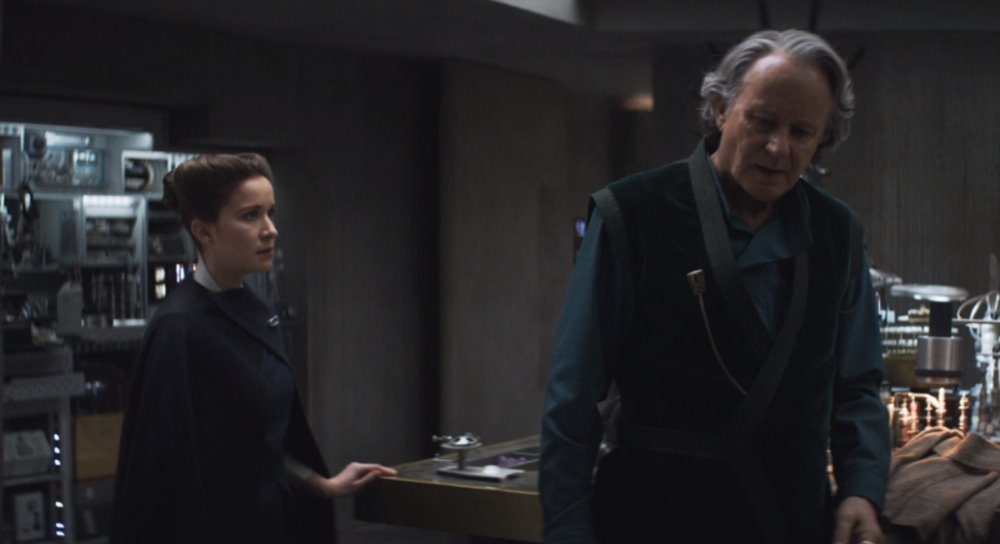 Ross Hollebon
Ross Hollebon
We’re still climbing—unless you’re Luthen or the spy within the ISB. This might be the trickiest one for me to write after making guest appearances on the podcasts of Coffee With Kenobi and The Rebel Base Card to discuss One Way Out.
The escape from Narkina 5 is amazing and highlights Cassian’s leadership and understanding of activating a team. Kino’s speech over the microphone to all the prisoners on the vessel is raw—and I do believe it is partially in homage to Howard Beal’s monologue in the 1976 film, “Network”.
There is a great deal to unpack from the escape—that I’m certain will be canvassed by my peers here—so I want to take us back to Coruscant.
Luthen manages to steal the show with his own speech in the depths of the capital city. We learn that Lonni from the ISB is a mole that was planted six years earlier. Like so many other characters, he’s now desperate to get out. The heat is becoming unbearable as the Empire tightens its grip—but as a play on the title of this episode, there is only one way out from the vow, and that option doesn’t include drawing breath. Luthen exudes this, declaring he has given up, “Calm. Kindness. Kinship. Love.” He continues, “I’ve given up all chance at inner peace. I’ve made my mind a sunless space…So what do I sacrifice? Everything!” It is crushing and gorgeous all at once. Earlier in the episode Mon, meeting with Davo, experiences a similar crossroads.
The senator from Chandrila has made the same vow to the Rebellion and it is now placing her in a place that potentially impacts Leida, her daughter. To properly launder her $400,000 credits she needs the help of Davo, a brilliant businessman who doesn’t necessarily work above board. Davo seeks legitimacy for his enterprise and family by marrying his son into the Mothma family—or at the very least getting the opportunity to introduce his son to Ledia, without the promise of betrothal. This whips the typically calm and measured Mon into a harsh response and immediate ejection of the Chandrilan financier from her home. She says she won’t consider his offer to which he responds, “That’s the first untrue thing you’ve said.” Does Mon’s financial dilemma offer her only one way out? One that will compromise what she has fought for in the best interest of her daughter’s freedom and future?
We have two episodes remaining in this season to figure out if any of the primary characters have more than one way out of their specific figurative or literal cell.
Mark Newbold and Mark Mulcaster discuss episode 10 on Making Tracks Reaction Chats.
Brian Cameron and Mark Newbold discuss episode 10 on Good Morning Tatooine.
- Stackpole, Michael A. (Author)
- English (Publication Language)
- 400 Pages - 11/01/2022 (Publication Date) - Random House Worlds (Publisher)


